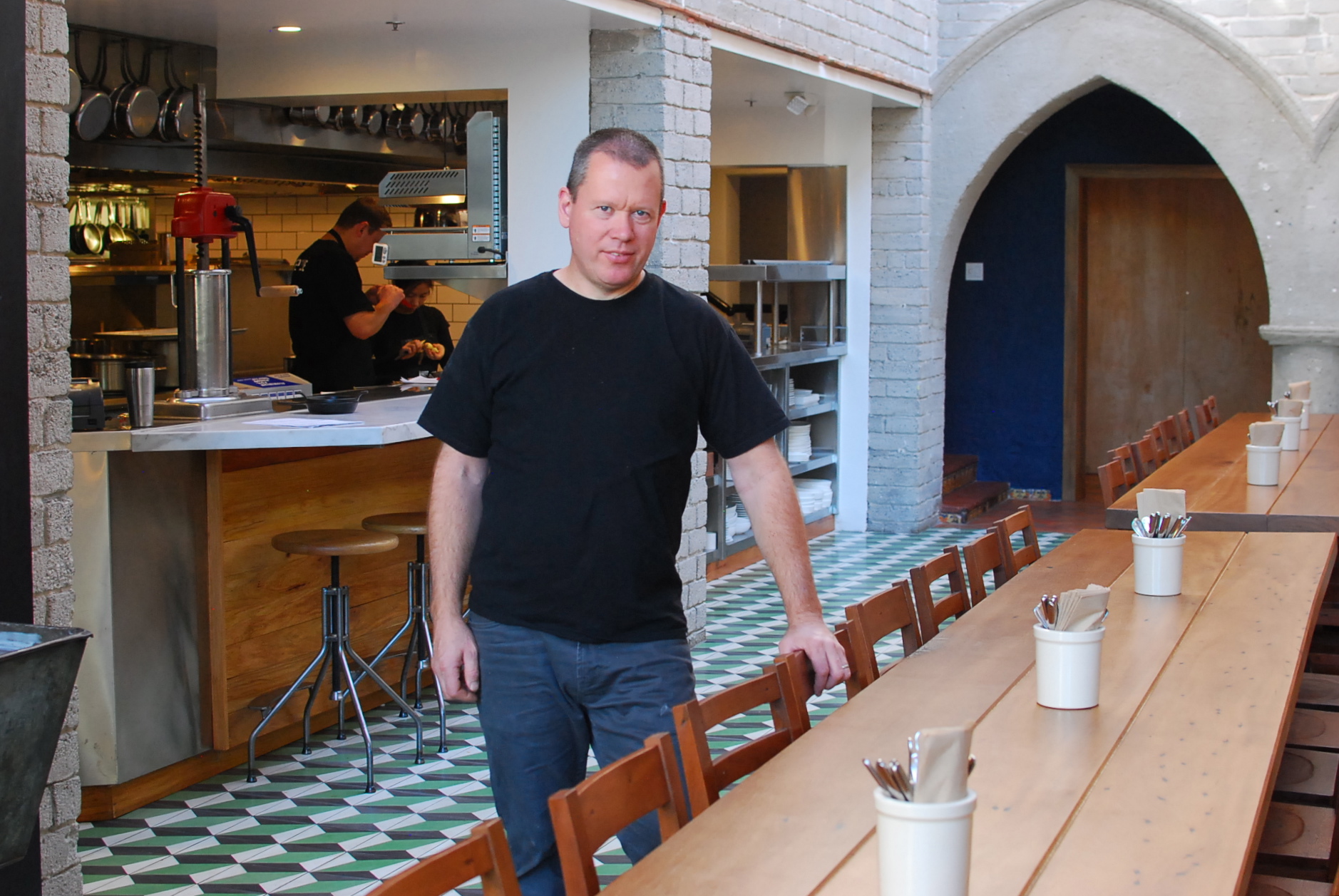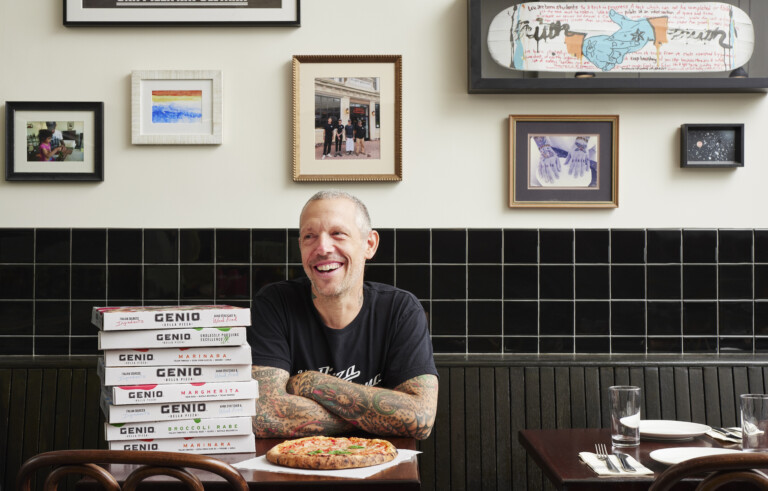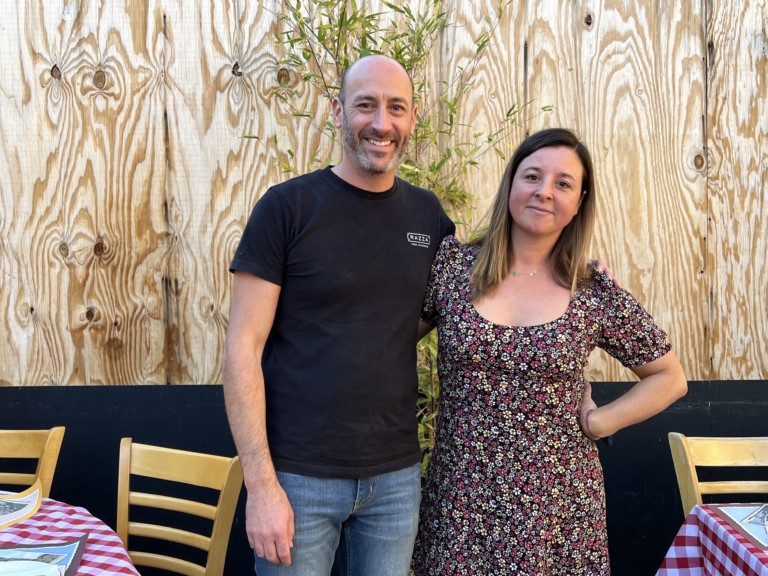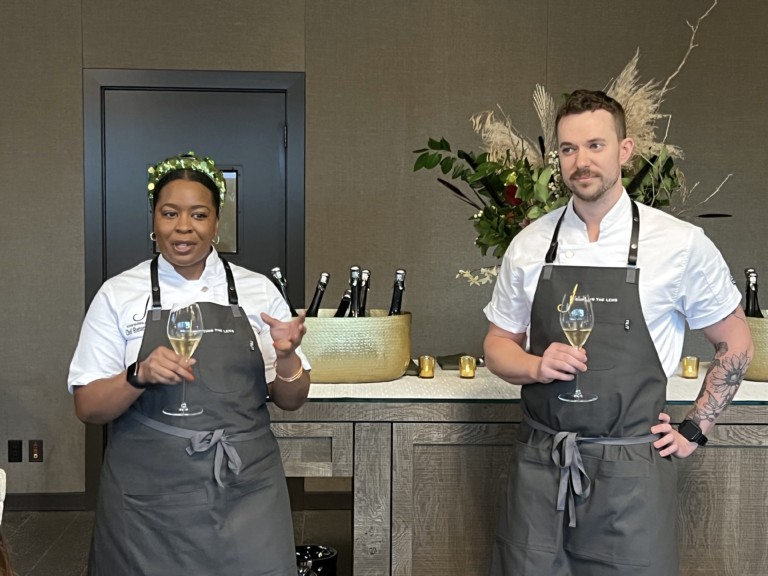San Diego native Walter Manzke has become one of the strongest culinary forces in California. He worked for high-profile chefs like Joachim Splichal (Patina Restaurant Group), Ferran Adrià (el Bulli) and Alain Ducasse (Le Louis XV in Monte Carlo’s Hotel de Paris) before opening Bouchee, Cantinetta Luca, and L’Auberge Carmel with chef-wife Margarita Manzke in Carmel-by-the-Sea. The couple returned south to Los Angeles, and Manzke helmed the kitchens at bygone Bastide and Arts District forerunner Church & State. In the past two years, he’s opened two Wildflour Cafe + Bakery branches with family in Manila, an East L.A.-meets-Tijuana concept called Petty Cash Taqueria in L.A., and a multi-faceted Mid-City restaurant called Republique, which is the culmination of a longtime vision the Manzkes shared, which they made a reality in the former Campanile space by partnering with restaurateur Bill Chait. On December 11, Manzke shared several insights at Republique.
In what ways do you think it helped prep you for Republique to open Petty Cash first?
This was delayed, obviously, which happens most of the time. It wasn’t bad, and it helped because I started hiring people. People left their other jobs and I was able to take care of them. We were able to open Petty Cash with some of the crew from here and keep them employed, which was actually a big help. Same thing for us…Petty Cash was something I’d been wanting to do for a long time, and I almost did that concept before. I didn’t really anticipate doing that before Republique, but things happen when they happen, and it’s worked out good.
How has your vision for Republique changed since you first thought of the concept?
It hasn’t changed a lot…I started with the vision when I went to Church & State and tried a lot of things out there, the whole formality of it, and a lot of the menu items. It was that, and Marge wanting to do something like this. That’s where this idea of this mixed concept came together, with a bakery, café, bistro. That was years ago when we started planning this. I don’t know how we were so lucky to end up with this space, because we didn’t have to adapt the concept, really, to fit in here. It already had a bakery. We had to put the equipment in, but it was a bakery before. Everything fit, and it hasn’t changed that much.
What does a dish have to be for you to put it on the menu here?
We’re still getting a feel for it, and it’s interesting how some of the dishes that I did at Church & State, I wasn’t even sure I wanted to do those anymore, or if I wanted to do something more creative and new. Some of those just didn’t work out. Some of the dishes that I’ve done at Church & State, like the escargots, are exactly the same, and everybody keeps thanking me for putting those back on, because they haven’t had them in years. There are some things like that, and it’s funny, because I tried some different versions of that, and it’s interesting how everybody steered me back to the same thing. There are some classic things on the menu, like that, that are proven over time, proven by me, and they just fit.
What’s an example of a new dish?
One of the dishes that was completely spontaneous, and fits the vision I had for the restaurant, which was to take classic bistro food, and do it in a different way. There will definitely be more of that, but it’s Brussels sprouts, which is a play on a frisee lardon salad. We take the center of the Brussels sprouts and roast them in a wood oven with bacon lardons, and put a little bit of frisee, just to associate with it. It has a poached egg on it, so it’s kind of a new way, or a different way, of doing frisee lardon salad. Everybody loves Brussels sprouts, and it’s been a great dish. We sell a lot of them, and people like it.
You grew up in San Diego. What did your parents do for a living, growing up?
My mother was at home, took care of my brother and I, and was very into gardening. My father was an engineer and worked in the defense industry.
Did either of them cook much?
It’s interesting because my mom was a really great cook, and not so much a great cook in the way of making elaborate recipes. More of a great cook, in that she always grew all the produce and was very resourceful and old world. She didn’t buy bread, she made it. That’s how I grew up. It was interesting how, when my father retired – I don’t know if it was more because of me, or because he retired – he became more into cooking. He cooks a lot now, almost more than my mom. He seems to go more for reading recipes and takes books from me, and reads recipes and tries to produce them. They both cook.
Was it a given that you would cook professionally, or did you consider other careers?
I had no idea that I would ever be a chef. I didn’t desire to be a chef. I didn’t know I was going to be a chef. I did work in restaurants early on. Basically my first job was in a restaurant, working as a busboy, and then I became a waiter. Definitely one thing about the restaurant business I always connected with, I was in high school, and others weren’t making much doing their jobs. I was a waiter at the time, making pretty good money, so I really just fell into it, fell more and more into it, and kept going back to it. I did construction for awhile, went back to restaurants and just always worked. The energy, especially, is what always drew me to it.
You’ve lived in a lot of places at this point. What is it about Los Angeles that appeals to you so much?
You know, it’s interesting, because I never would have thought of ending up in Los Angeles, especially when I lived in Northern California and grew up in San Diego. It’s almost like L.A. is this place in the middle where you never go. I felt it even more when I lived in Northern California. In Northern California, nobody wants to go to Southern California. They don’t want anything to do with it. In San Diego, too. I never wanted to be here. When I started cooking, I was introduced to Joachim Splichal, and thought I had nothing to lose, it would be a great opportunity to work for him, and I worked for him for a year, and I ended up spending up a total of nine years with him, initially for two-and-a-half years, left and came back for another six-and-a-half years, and then came back to L.A. again. There’s always been something that’s drawn me and Marge to here. We met here.
Who else do you look to in the restaurant industry at this point for inspiration, guidance or advice?









Leave a Comment